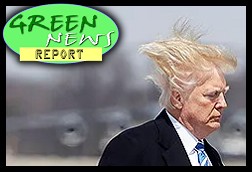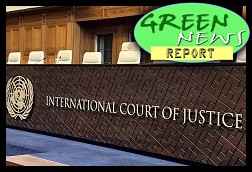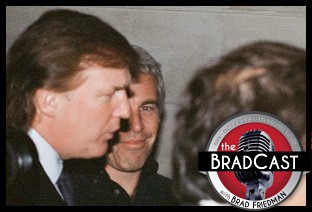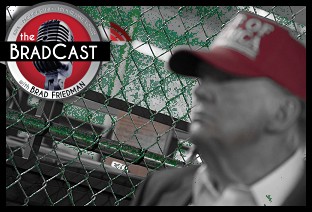 When Harvard Law Professor Laurence Tribe was interviewed by MSNBC's Lawrence O'Donnell last year, his remarks specifically related to Presidential self-pardons. His observations, however, reveal why the Department of Justice (DOJ) should also contest any effort by President Donald J. Trump to grant a pardon to anyone who could be considered a co-conspirator in carrying out an insurrection designed to allow the loser of the 2020 Presidential Election to remain in power...
When Harvard Law Professor Laurence Tribe was interviewed by MSNBC's Lawrence O'Donnell last year, his remarks specifically related to Presidential self-pardons. His observations, however, reveal why the Department of Justice (DOJ) should also contest any effort by President Donald J. Trump to grant a pardon to anyone who could be considered a co-conspirator in carrying out an insurrection designed to allow the loser of the 2020 Presidential Election to remain in power...
In an amicus brief [PDF] filed late last year in the Michael Flynn case, the legal advocacy group, Free Speech for People (FSFP) observed that, while the U.S. Supreme Court, in Schick v Reed (1974), described the Presidential pardon power as "plenary", or absolute, the Court added that the limitations on the pardon power, "if any, must be found in the Constitution itself." Citing a recent Georgetown Law Review article [PDF] that reached a similar conclusion, FSFP argued that the U.S. Constitution's command that a President ensure that the laws be "Faithfully Executed" broadly prevents a President from granting a pardon for a corrupt purpose.
Although U.S. District Court Judge Emmett Sullivan issued a 43-page Memorandum Opinion explaining that he had dismissed the Flynn case as moot following Flynn's acceptance of a Presidential pardon, the court neither referenced nor rejected the corrupt purpose limitation set forth by the FSFP amicus brief. Even if that ruling implicitly entailed a rejection of the FSFP argument, as applied to the Flynn case, it would not foreclose a DOJ challenge to the limits of the pardon power with respect to the unprecedented events that occurred on Jan. 6th.
This is not an abstract question. An attorney representing insurrectionist Jacob Anthony Chancey announced he'd request a Presidential pardon, Democracy Now's Amy Goodman reported. Evidence suggests that Chancey, who was filmed "shirtless, wearing buffalo horns and holding a spear", may be one of the rioters who intended "to capture and assassinate elected officials," according to Goodman. As rioters yelled "Hang Mike Pence", the charging documents allege, Chancey aka the "QAnon Shamen", left a note on the VP's desk that ominously warned that "it's only a matter of time, justice is coming", according to Anna Lucia Murillo of the Daily Beast.
No President, before this one, has ever been implicated in a violation of 18 U.S.C. § 2383 - Rebellion or insurrection or 18 U.S. Code § 2384 - Seditious conspiracy. It is virtually impossible to believe that the framers of the U.S. Constitution intended the availability of the pardon power to be utilized as an instrument designed to entice others to assist in the ultimate violation of the solemn oath to see that the laws of the United States are "Faithfully Executed". The framers of the U.S. Constitution regarded the duty to "Faithful Execute" our laws as so central to our constitutional scheme of governance that Art. II, §1, Cl. 8 of the U.S. Constitution mandates that every President "shall" take the oath before entering office.
 Ernest A. Canning is a retired attorney, author, and Vietnam Veteran (4th Infantry, Central Highlands 1968). He previously served as a Senior Advisor to Veterans For Bernie. Canning has been a member of the California state bar since 1977. In addition to a juris doctor, he has received both undergraduate and graduate degrees in political science. Follow him on twitter: @cann4ing
Ernest A. Canning is a retired attorney, author, and Vietnam Veteran (4th Infantry, Central Highlands 1968). He previously served as a Senior Advisor to Veterans For Bernie. Canning has been a member of the California state bar since 1977. In addition to a juris doctor, he has received both undergraduate and graduate degrees in political science. Follow him on twitter: @cann4ing


 A Pu Pu Platter of Trump Corruption: 'BradCast' 7/29/25
A Pu Pu Platter of Trump Corruption: 'BradCast' 7/29/25  'Green News Report' 7/29/25
'Green News Report' 7/29/25
 GOP Cuts to Medicaid, Medicare, ACA Could Trigger 'Catastrophic' Crisis This Fall: 'BradCast' 7/28/25
GOP Cuts to Medicaid, Medicare, ACA Could Trigger 'Catastrophic' Crisis This Fall: 'BradCast' 7/28/25 Sunday 'Pedo Files' Toons
Sunday 'Pedo Files' Toons Landmark Climate Ruling at World Court; More Epstein Trouble for Petty Little Tyrant: 'BradCast' 7/24/25
Landmark Climate Ruling at World Court; More Epstein Trouble for Petty Little Tyrant: 'BradCast' 7/24/25 'Green News Report' 7/24/25
'Green News Report' 7/24/25 Trump's Epstein 'Conspiracy Machine Not Going Away': 'BradCast' 7/23/25
Trump's Epstein 'Conspiracy Machine Not Going Away': 'BradCast' 7/23/25 Dems Unlikely to Counter GOP's TX Redistricting Scheme: 'BradCast' 7/22/25
Dems Unlikely to Counter GOP's TX Redistricting Scheme: 'BradCast' 7/22/25 'Green News Report' 7/22/25
'Green News Report' 7/22/25 Not a Drill!: Trump Gutting News Media, Press Freedoms: 'BradCast' 7/21/25
Not a Drill!: Trump Gutting News Media, Press Freedoms: 'BradCast' 7/21/25 Sunday 'Wonderful Secret' Toons
Sunday 'Wonderful Secret' Toons 'Green News Report' 7/17/25
'Green News Report' 7/17/25 CO Election Clerks Block Vote System Breach: 'BradCast' 7/17/25
CO Election Clerks Block Vote System Breach: 'BradCast' 7/17/25 'Superman is Story of America'. No Wonder MAGA Hates Him: 'BradCast' 7/16/25
'Superman is Story of America'. No Wonder MAGA Hates Him: 'BradCast' 7/16/25  Trump IRS: Churches May Endorse. (Are All Nonprofits Next?): 'BradCast' 7/15/25
Trump IRS: Churches May Endorse. (Are All Nonprofits Next?): 'BradCast' 7/15/25 Support for Immigrants Skyrockets Amid Trump's Crackdown: 'BradCast' 7/14/25
Support for Immigrants Skyrockets Amid Trump's Crackdown: 'BradCast' 7/14/25  Democracy STILL Our Best Way Out of This -- And Repubs Know It: 'BradCast' 7/10/25
Democracy STILL Our Best Way Out of This -- And Repubs Know It: 'BradCast' 7/10/25 'Mass Shooter Subsidy'?: More Dumb, Deadly Stuff in Trump's New Law: 'BradCast' 7/9/25
'Mass Shooter Subsidy'?: More Dumb, Deadly Stuff in Trump's New Law: 'BradCast' 7/9/25  Trump's New Law Supersizes ICE, Mass Detention: 'BradCast' 7/8/25
Trump's New Law Supersizes ICE, Mass Detention: 'BradCast' 7/8/25 Texas Flooding Tragedy Was Both Predictable and Predicted: 'BradCast' 7/7/25
Texas Flooding Tragedy Was Both Predictable and Predicted: 'BradCast' 7/7/25
 VA GOP VOTER REG FRAUDSTER OFF HOOK
VA GOP VOTER REG FRAUDSTER OFF HOOK Criminal GOP Voter Registration Fraud Probe Expanding in VA
Criminal GOP Voter Registration Fraud Probe Expanding in VA DOJ PROBE SOUGHT AFTER VA ARREST
DOJ PROBE SOUGHT AFTER VA ARREST Arrest in VA: GOP Voter Reg Scandal Widens
Arrest in VA: GOP Voter Reg Scandal Widens ALL TOGETHER: ROVE, SPROUL, KOCHS, RNC
ALL TOGETHER: ROVE, SPROUL, KOCHS, RNC LATimes: RNC's 'Fired' Sproul Working for Repubs in 'as Many as 30 States'
LATimes: RNC's 'Fired' Sproul Working for Repubs in 'as Many as 30 States' 'Fired' Sproul Group 'Cloned', Still Working for Republicans in At Least 10 States
'Fired' Sproul Group 'Cloned', Still Working for Republicans in At Least 10 States FINALLY: FOX ON GOP REG FRAUD SCANDAL
FINALLY: FOX ON GOP REG FRAUD SCANDAL COLORADO FOLLOWS FLORIDA WITH GOP CRIMINAL INVESTIGATION
COLORADO FOLLOWS FLORIDA WITH GOP CRIMINAL INVESTIGATION CRIMINAL PROBE LAUNCHED INTO GOP VOTER REGISTRATION FRAUD SCANDAL IN FL
CRIMINAL PROBE LAUNCHED INTO GOP VOTER REGISTRATION FRAUD SCANDAL IN FL Brad Breaks PA Photo ID & GOP Registration Fraud Scandal News on Hartmann TV
Brad Breaks PA Photo ID & GOP Registration Fraud Scandal News on Hartmann TV  CAUGHT ON TAPE: COORDINATED NATIONWIDE GOP VOTER REG SCAM
CAUGHT ON TAPE: COORDINATED NATIONWIDE GOP VOTER REG SCAM CRIMINAL ELECTION FRAUD COMPLAINT FILED AGAINST GOP 'FRAUD' FIRM
CRIMINAL ELECTION FRAUD COMPLAINT FILED AGAINST GOP 'FRAUD' FIRM RICK SCOTT GETS ROLLED IN GOP REGISTRATION FRAUD SCANDAL
RICK SCOTT GETS ROLLED IN GOP REGISTRATION FRAUD SCANDAL VIDEO: Brad Breaks GOP Reg Fraud Scandal on Hartmann TV
VIDEO: Brad Breaks GOP Reg Fraud Scandal on Hartmann TV RNC FIRES NATIONAL VOTER REGISTRATION FIRM FOR FRAUD
RNC FIRES NATIONAL VOTER REGISTRATION FIRM FOR FRAUD EXCLUSIVE: Intvw w/ FL Official Who First Discovered GOP Reg Fraud
EXCLUSIVE: Intvw w/ FL Official Who First Discovered GOP Reg Fraud GOP REGISTRATION FRAUD FOUND IN FL
GOP REGISTRATION FRAUD FOUND IN FL

































